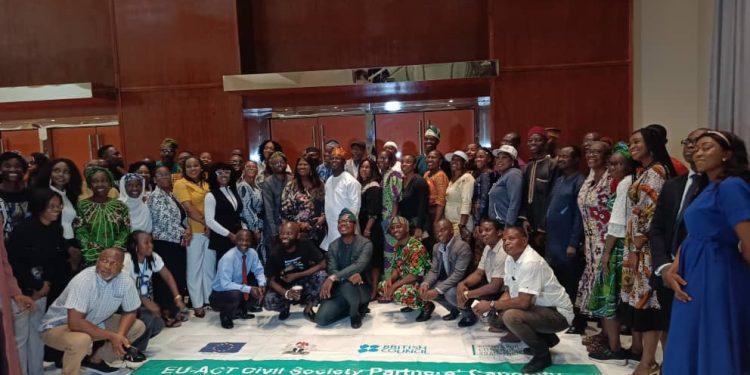The European Union – Agents for Citizens-Driven Transformation (EU-ACT) Programme of the British Council has held its close-out event in Lagos, with reflection on key achievements, challenges and sustainability plans.
The 5-year programme which built the capacity of almost 250 Civil Society Organizations (CSOs) in 10 states across Nigeria also created an opportunity for an enabling regulatory environment to help CSOs thrive and work effectively.
In his presentation about the impact of the project, Mr Damilare Babalola, ACT National Programme Manager (NPM), explained that the goal of the project was essentially to strengthen the civil society sector.
Mr Babaola buttressed that “we focused on two areas of activities; support to strengthening institutional capacity, organizational development for selected number of CSOs and also to create an opportunity to enable the regulatory environment for these organizations to do their work effectively.
“Our theory is that if there are a lot of well-capacitated organizations working in the sector and there is an enabling environment for them to do their work, they will thrive and ultimately become more credible, transparent and accountable agents of sustainable development.”
Babalola disclosed that a total of 40 networks and 233 CSOs’ capacities were developed to strengthen their internal systems, programme approach and external relations.
He thereafter highlighted collaboration among critical actors as a major factor in enhancing sustainability, adding that it would help the gains of the EU-ACT programme to make a lasting impact.
Buttressing the importance of collaboration, Mr Adeshola Afariogun, the EU-Act Focal person in Lagos State explained that collaboration would help the CSOs to support one another and others who have not benefitted directly from the programme.
Mr. Afariogun charged the CSOs to “continue to utilize the capacity that they have gained and they need to link up with our Virtual Peer Learning Hubs (VPLH) which is our sustainability plan.”
Mrs Yemisi Ransome-Kuti, the Founder of Network of NGOs in her remark commended the EU-ACT programme for the remarkable impacts that have been made among CSOs.
Speaking about the structure of NNGO which provides opportunity for CSOs to collaborate effectively, the matriarch charged CSOs to “build your structure to drive collaboration because we have a lot to learn from others.”
Through the programme, more than 150 capacity-strengthening training/coaching, mentoring sessions were delivered across 10 states; 19 organizational development domains supported; 54 emerging CSOs trained to improve their financial management and organizational strategy development; and 50 CSOs led by women, youths and PWDs trained on how to use digital platforms to enhance their policy advocacy work.
Significantly, over 10 Virtual Peer Learning Hubs established and coordinated by CSOs at the state level to enhance sustainability.

